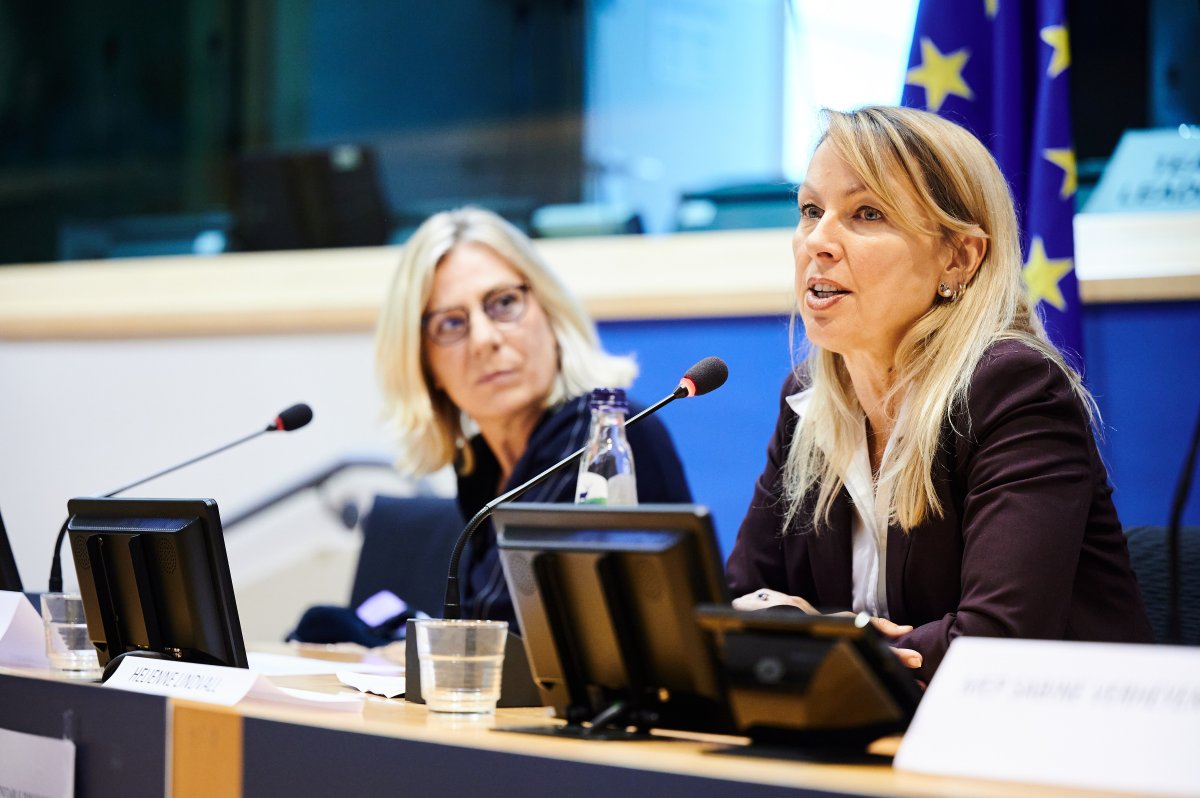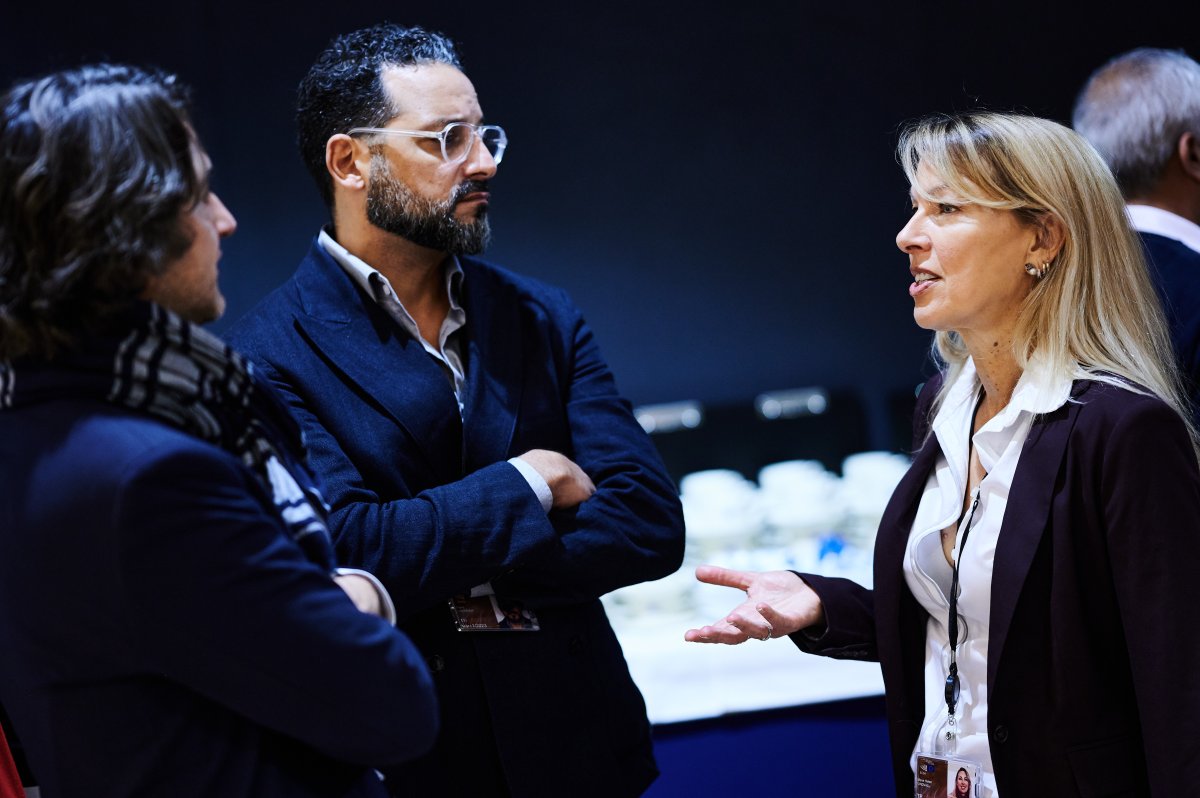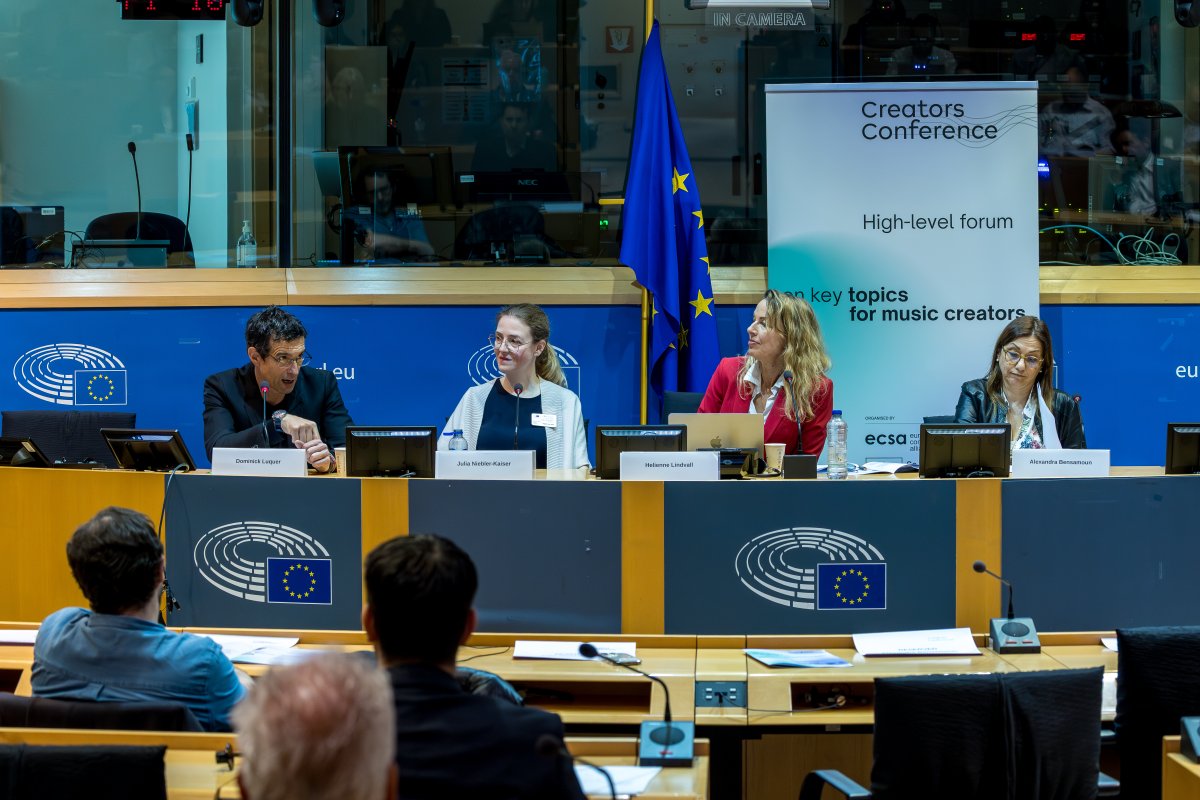Helienne Lindvall, President of ECSA, voices authors' urgent calls for an "effective and timely" implementation of the EU AI ACT, as the current implementation measures are "toothless and disappointing" for ensuring authors' rights and especially creators' consent, remuneration and transparency for the use of their works. She expresses the music creators' expectations for a European strategy for the Music sector in the next mandate, including a European Music Observatory.
The discussion includes ECSA's reactions on the draft of the upcoming own-initiative report of the JURI Committee in the European Parliament on Generative AI and Copyright, the challenges risen during proceedings over the implementation package of the EU AI Act and views over the AgoraEU programme for cultural funding in the next MFF 2028-2034.
CU. What are your latest data on the most urgent challenges for European composers and songwriters in the AI era?
Today, while AI can offer opportunities to music creators, generative AI companies exploit creators’ works without any authorisation, remuneration nor transparency. This is simply unacceptable.
In recent years, various studies on the impact of AI on music creators have painted a very alarming picture, confirming what we all feared: the growth of AI will squeeze creators’ income to the benefit of the tech industry. For instance, a 2024 study by CISAC, the global body of collecting management organisations, found that music creators’ income will decrease by 24% and generate a loss of €10 billion by 2028 – meanwhile, the market size of generative AI music outputs is expected to grow to a staggering €16 billion by 2028.
The study also highlights that by 2028, AI-generated music will account for 20% of all streaming revenues, squeezing authors’ share of the pie from the current 8% to a mere 6%. These findings point to the urgent need to place transparency, creators’ consent, and remuneration at the centre of policy regulating generative AI, and to reform the music streaming ecosystem, which is increasingly unsustainable for composers and songwriters.
CU. Apart from numbers, how does AI-generated content affect music authors? Are listeners also affected?
The recent news coverage of AI-generated band “Velvet Sundown”, with more than a million monthly listeners on Spotify, is the most glaring example of what the absence of strong rules on AI will lead to. Without proper safeguards, AI-generated music will increasingly divert royalties from human authors and performers to the benefit of AI companies, with little to no transparency for listeners and creators about who is getting paid and how much AI-generated content is present on streaming platforms.
CU. What is your view on how the current AI European legislation deals with these challenges?
In light of these challenges, ECSA and other creators’ organisations are very concerned with the European Commission’s current implementation of the AI Act, a piece of legislation which was supposed to create rules for responsible and trustworthy AI in Europe.
Key tools for implementing the AI Act such as the GPAI Code of Practice, the GPAI guidelines and the template for the summary of content used for training by AI providers are toothless and disappointing.
The Code of Practice, a voluntary tool, contains only weak commitments for AI providers, while disclosure of information about the content used for training in the template summary is limited to high-level, general information that is inadequate to allow authors and rightsholders to know whether their works have been used. Even more worryingly, however, is that the AI Act guidelines issued by the Commission clearly state that GPAI models for music generation, such as those by Suno AI and Udio, will not fall under the scope of the AI Act’s obligations. Left without any credible rules, authors and other rightsholders’ only choice will be to engage in expensive and lengthy legal battles.
Left without any credible rules, authors and other rightsholders’ only choice will be to engage in expensive and lengthy legal battles.

On the other hand, we welcome the European Parliaments’ report on copyright and generative AI, overseen by MEP Axel Voss in the Legal Affairs (JURI) Committee, which seeks to upholds the principles of authors’ consent, remuneration and transparency in the regulation of AI.
CU. Regarding the latter, on the 12th of September MEPs are expected to table amendments on the draft report by Rapporteur MEP Axel Voss, over the JURI Committee’s own Initiative Report on Generative AI and Copyright. What are your expectations from the negotiations in the European Parliament?
We warmly welcome and appreciate Mr. Voss’s report and believe that the first draft of the report constitutes an important step in the right direction. In particular, we appreciate that it stresses several important concerns for creators and other rightsholders, including many of the ones included in the joint letter that ECSA and 12 other organisations of authors, performers and other creative workers published on 19 June. Our letter included four key asks to MEPs: holding a democratic debate on the applicability of the TDM exceptions (Art. 3 and 4 of the 2019 Copyright Directive), calling for an effective and timely implementation of the AI Act, ensuring authors and performers can authorise the use of their works and be remunerated for it, and ensuring the protection of the moral rights and personal data of authors and performers.
Among many other important points, the report notably rejects the application of the text and data mining (TDM) exception (Article 4) to generative AI, explicitly stating that it was neither drafted nor intended to allow the en masse use of copyrighted works for AI training and that it probably does not comply with international copyright law. This point also featured prominently in a recently published study on copyright and AI commissioned by the JURI Committee. In addition, MEP Voss's report recognises that the use of protected works for AI training without remuneration undermines the sustainability of the creative sector. The report also calls on the Commission to immediately impose a remuneration obligation on general-purpose AI providers, to propose full and actionable transparency by AI providers, and to establish a presumption of use of protected works in AI training to aid rightsholders in enforcing their rights. These are some of the most important elements of the report that we are calling to be maintained and strengthened in the final draft.
Unfortunately, the implementation of the AI Act through the GPAI Code of Practice, the GPAI guidelines and the transparency template has been extremely disappointing. We therefore believe the European Parliament report can play a crucial role in rebalancing the situation and ensuring that authors’ rights and the EU copyright framework are upheld against these challenges. In the coming months, ECSA will continue engaging with the JURI Committee to ensure that it places authors’ consent, remuneration, and transparency at its centre.
CU. In July, the European Commission presented its proposal for the 2028–2034 Multiannual Financial Framework (MFF), including a new overarching programme, AgoraEU, which brings together the existing Creative Europe and CERV programmes. What is your view on the new programme?
We welcome the budget increase for culture in the Commission’s proposal for the next MFF, as well as the focus on improving artists’ working conditions through the newly introduced AgoraEU programme. This creates a crucial opportunity to tackle the needs of the European cultural ecosystem, including through sector-specific actions for music and concrete measures to enhance the livelihoods of music creators. As the European Parliament and Member States will now begin discussions on these proposals, we count on their commitment to ensure robust funding, support for the creative community, and secure targeted measures for the music sector in the next programme.
Currently, the “Creative Europe – Culture strand” accounts for 21% of the proposed AgoraEU budget (approximately €1.796 million in total), which represents an increase in absolute terms compared to its previous share of 33% within the smaller Creative Europe budget (about €800 million). Although the upward trend is encouraging, this allocation represents only the minimum necessary to sustain and strengthen Europe’s cultural ecosystem.
At a time when artistic freedom and artists' working conditions faces mounting pressures, when European culture must assert its voice in increasingly globalised and competitive markets, and when social cohesion is more vital than ever, addressing all those challenges requires both ambitious funding and forward-looking policies. We count on the European Parliament’s support and on the Council to not only preserve but further enhance the funding dedicated to Creative Europe, to foster cultural diversity and boost the economic potential of the creative industries while improving creators’ working conditions.
In general, we are glad to see that the “Creative Europe – Culture strand” preserves its main goals and funding schemes, especially through its support to pan-European platforms for emerging artists and support for networks of cultural and creative organisations. These instruments play a crucial role in enhancing the resilience and diversity of Europe’s cultural sector, and ensuring the representation of a broad spectrum of voices, including those of authors and creators. We also strongly welcome the Commission’s emphasis on ensuring the “full respect of artistic freedom and diversity of cultural expressions” and the “improvement of working conditions for artists and cultural and creative professionals”, featured as key priority in the proposal.
We strongly welcome the Commission’s emphasis on ensuring the “full respect of artistic freedom and diversity of cultural expressions” and the “improvement of working conditions for artists and cultural and creative professionals”.

This is a crucial step toward embedding conditionality within the programme, ensuring that public funding guarantees the rights and fair treatment of artists and creators who face precarious working conditions – including harmful contractual practices such as buy-outs and pseudo-publishing.
CU. How do you envision the European music sector evolving under the framework of AgoraEU in the context of the next MFF?
Regarding music in particular, we regret that the proposal does not mention any dedicated measures for the European music sector or follow-up to the Music Moves Europe (MME) initiative. However, the budget reinforcement offers the chance to support a sector-specific approach focused on the concrete challenges of the music sector. Such an approach has been endorsed by EU Culture Ministers in their open letter to EU Commissioners last January and by the European Parliament in a resolution which calls for strengthening the Creative Europe programme through comprehensive action on music and invites the Commission to consider “introducing a European industrial strategy for music”.
We regret that the proposal does not mention any dedicated measures for the European music sector or follow-up to the Music Moves Europe (MME) initiative.

The One Voice for European Music initiative can serve as a guide to establish such a comprehensive policy strategy for the music sector, supported by ambitious EU-level funding mechanisms . One of the main recommendations outlined in the latest document is a reinforced support framework for the European music sector, including with the establishment of a European Music Observatory. This Observatory would be tasked with mapping and analysing sector dynamics, in order to inform evidence-based policy measures.
As a final point, we really consider it crucial that appropriate funding is supported but also strategically aligned with a clear and comprehensive policy strategy for the music sector, reflecting its economic, social and cultural importance across Europe.
Who is Helienne Lindvall
Helienne Lindvall is an award-winning professional songwriter, musician and columnist. She’s the former Chair of the Ivor Novello Awards, Board Director of the Ivors Academy and Trustee of the Ivors Academy Trust. Helienne is the writer behind the Guardian music industry columns Behind the Music and Plugged In, and is the former Head of Business & Songwriter relations for song data management platform Auddly/Sessions, backed by hitmakers Max Martin and Abba’s Björn Ulvaeus.
Images:
Image 1: © John Hollingsworth - Courtesy of Helienne Lindvall
Images 2-3: © François de Ribaucourt - Courtesy of Helienne Lindvall
Image 4: © Omar Havana - Courtesy of Helienne Lindvall











